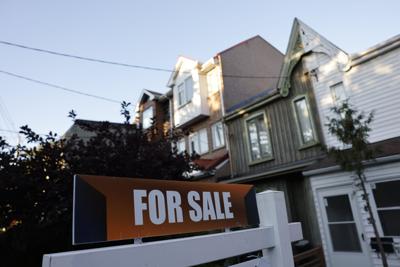Inflation and interest rates combined with "post-COVID malaise" have Canadians feeling pessimistic about the economy, a new poll suggests.
Pollara Strategic Insights' annual economic outlook has found four in five people think Canada has already been plunged into a recession and half are gloomy about this year.
Despite the fact the country is not technically in recession — defined as two consecutive quarters of the economy shrinking instead of growing — 82 per cent of those surveyed believe it is.
Only 10 per cent felt Canada is in a time of economic growth with eight per cent unsure.
"For Canadians, 'recession' is a state of mind more than anything else," Dan Arnold, Pollara's chief strategy officer, said Monday.
"They are not looking at the economists' definition of 'recession,'" said Arnold, noting this latest poll echoes last year's survey.
"The story is that things really haven't changed much since last year — even though inflation rates have gone down, people are still feeling it," he said.
Inflation sits at 3.1 per cent, according to Statistics Canada, while the Bank of Canada's key interest rate is five per cent.
You might be interested in
"All of the optimism seems to have got sucked out of Canadians during COVID. There's a real post-COVID malaise. People feel things aren't getting better," said Arnold, referring to the pandemic that hit the country in March 2020 and lingered for three years.
Pollara surveyed 1,503 people across Canada from Dec. 6 until Dec. 11. While online panel samples cannot be assigned a margin of error, for comparison purposes, a random sample of this size would have one of plus or minus 2.6 percentage points, 19 times out of 20.
The firm, which has conducted this annual review of perceptions and expectations of the economy for 29 years, found 52 per cent expect things to "worsen" in 2024 with only 15 per cent feeling the outlook could improve.
About one-quarter — 24 per cent — felt things would "not change" with eight per cent unsure.
"Economic expectations become a bit self-fulfilling when it comes to things like consumer confidence and business confidence," noted Arnold.
When it comes to the cost of living, 46 per cent said they "expect to fall behind in 2024" with 38 per cent believing they will "keep pace" and eight per cent feeling their household income will "more than keep pace" while nine per cent didn't know.
Respondents were also asked to select up to four words "that best describe the feelings that you have about your personal financial situation."
More than half — 53 per cent — said "worried" while 30 per cent said "calm"; 28 per cent "upset"; 27 per cent "optimistic"; 27 per cent "sad"; 26 per cent "confident"; 26 per cent "pessimistic"; 24 per cent "resigned"; 15 per cent "ashamed"; 11 per cent "proud"; 11 per cent "happy"; seven per cent "bored"; six per cent "inspired"; five per cent "excited"; and five per cent had "no feeling about this."
Pollara found that people's housing situations, perhaps not surprisingly, significantly affected their responses.
Among homeowners with mortgages paid off, the top emotion was "confident" with 44 per cent followed by "calm" at 39 per cent, "worried" at 37 per cent, "optimistic" at 31 per cent and "resigned" at 25 per cent.
For those with a mortgage to pay, 57 per cent said "worried," 31 per cent "upset," 29 per cent "optimistic," 28 per cent "calm," and 27 per cent "pessimistic."
Among renters, things were more dire — 65 per cent were "worried," 34 per cent said "upset," 34 per cent said "sad," 27 per cent "pessimistic" with 26 per cent "calm."
The polling firm also asked respondents about their top cost-of-living worries.
About three-quarters — 74 per cent — said the cost of groceries was a "major or moderate source of stress" compared to 77 per cent in the previous year's poll.
Almost two-thirds — 63 per cent — said housing expenses, up slightly from 59 per cent last year, while 57 per cent said gasoline prices, down from 60 per cent before.
Despite those concerns, Canadians remain bullish about their employment security, with 19 per cent saying it is "likely" someone in their household will lose their job this year.
That matches the lowest rate in the annual survey since 2006.
For comparison, 20 per cent were worried about their employment prospects in the 2023 poll, 26 per cent in 2022, 35 per cent in 2021 and 25 per cent in 2020.
"This is not a 'recession' where people are worried about losing their jobs," said Arnold.













Anyone can read Conversations, but to contribute, you should be a registered Torstar account holder. If you do not yet have a Torstar account, you can create one now (it is free).
To join the conversation set a first and last name in your user profile.
Sign in or register for free to join the Conversation